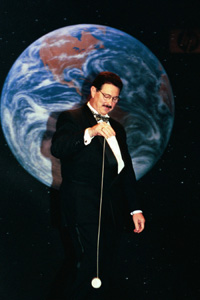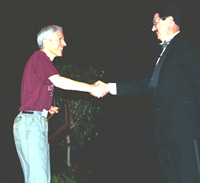 |
Click for Bradmark Sponsor Message |
| September 1999
Sterling’s 3000 address unveils GUI plans HP World talk uncovers new alliances, functionality — and dances Taking a cue from a business server with everlasting style, HP 3000 division general manager Harry Sterling wore a tuxedo to address more than 1,000 customers at HP World, describing a new look HP has unveiled for the system’s interface using Java. Sterling’s speech also noted that new security capability for the 3000’s Apache Web browser is in the works, as well as a Shared Source program that gives customers the ability to improve some parts of HP’s included software for HP 3000s. Sterling also paid honors to a classic advocate of the HP 3000, presenting Adager’s Alfredo Rego with HP’s 1999 3000 Contributor’s Award.
“Just like this yo-yo and just like my tux are always in style, so is the 3000,” Sterling said. New GUI vision While pointing out that the 3000 has the durability of that classic toy, HP said it is putting the newest interface on its longest selling business system with the Java-based GUI plans. “I’m very excited about our new graphical user interface for MPE applications,” Sterling said. “For many years you’ve told us HP should have a strategy for providing graphical user interfaces for 3000 applications. We’ve listened, and today we want to share with you the direction we think you want. We think we are dancing the right step, but we want you to take a look at it and let us know.” The new interface is standards-based, uses leadership technology, and employs the Java Foundation Classes (JFC). HP will be bundling an advanced toolkit — which requires a $500 third-party development environment tool — that it says will provide all capabilities needed to create rich graphical environments for any application. “Our intended strategy is to run the JFC on a client platform,” Sterling said, “which can be Windows, Linux, Macintosh or many others. The JFC client can communicate with the 3000 in a variety of ways — and yes, this includes Web-based access to your 3000 applications.” In a special seminar the day after Sterling’s speech, HP shared the details of the GUI plan called Visage. Mike Yawn, the CSY engineer who’s leading the Java project for the 3000, outlined the elements of using Java to build GUIs for existing 3000 applications, as well as creating interfaces from scratch for new apps. CSY engineer Bill Bennett and Chuck Townsend of Synkronix — the company that provides the $500 Blue/J development environment — also spoke on Visage. Secure Web server promised As it has at prior HP World conferences, HP promised a version of a Web server for the HP 3000 that can handle secure transactions. This time Sterling backed up the forecast with news that HP is using the BSAFE/SSL-C security toolkit that it licensed from RSA earlier this year. “This enables customers to perform secure Internet transactions on the HP 3000,” Sterling said. The secure Web services will arrive using a secure version of Apache Web server, which will be offered for a license fee to 3000 sites. (See our NewsWire Briefs item for more details.) Sterling also made note that Willow Technology has ported the MQ Series client to the 3000. The software enables middleware to link the 3000 with non-3000 systems, especially IBM mainframes. Sterling also noted that Level 8 Systems announced Falcon MQ, a utility to connect Windows NT applications with enterprise applications on the HP 3000. Shared source code Sterling announced that the MPE programs QUERY and EDITOR, as well as Java class libraries for TurboIMAGE and Vplus, are available for 3000 customers to improve and modify. The program is being called Shared Source, and the check-in and check-out of the source code is managed by the Interex users group. It’s similar in spirit to the Open Source movement in its intentions, but the software rights remain in HP’s hands even after customers make improvements to the code. Interex had source code ready for check-out in the week following HP World for EDITOR and the TurboIMAGE Java class library. Customers do not need to be members of Interex to check out the code. HP was cleaning up the QUERY source code before placing it on the Interex Web site; details are at www.interex.org/t ech/3000/hp30003.html The program deviates from the Open Source model in several ways. For example, Interex — not the programmer who adds value to the source code — controls re-distribution of derived works from the HP source. That means that changes can be used by only by a programmer’s company, or can be given to Interex, which will distribute the changes according to its policies. Quality of the contributed improvements will be evaluated first by a team of volunteers at Interex, and then by HP. Only after changes have passed these two levels will HP consider integrating them into its versions of the products. Until those changes are integrated, HP won’t be supporting derived versions of things like QUERY and EDITOR. Despite some of these limitations, HP believes the program can bring benefits through a new approach to enhancements. “New features and enhancements can be turned around quicker this way than in the standard MPE enhancement request process,” Sterling said. “In later phases we will include other parts of MPE. You are seeing a new mindset at HP, doing the things that will make it possible for us all to be a pivotal player in Chapter Two of the Internet. Many of you are saying it’s about time — and I agree.” Contributor’s Award Sterling presented HP’s annual HP 3000 Contributor’s Award to Adager founder Alfredo Rego at this year’s conference, recognizing the programmer and 3000 advocate for his work promoting the platform.
“The fact that he is a programmer for his own company seems secondary to helping customers understand the value of the 3000,” Sterling said in presenting the award. Rego, whose history with MPE dates back to 1975, displayed surprise as he accepted the award, saying “I’m speechless.” But he then managed a forecast about the 3000’s role in developing e-services on the Internet. “Chapter 1, Unix,” he said. “Chapter 2, Windows 2000. Chapter 3, HP 3000.” “Alfredo is an example of one of our greatest assets,” Sterling said in closing his speech. “It’s important to note how much these people have contributed to our success. As the 3000 experiences new growth and success and we welcome new customers, we will remember how we got here. To all our loyal customers, thank you.” |
Copyright The 3000 NewsWire. All rights reserved.

 The hour-long talk was built
around the theme of “The HP 3000: Always in Style,” and
featured a video of customer interviews comparing the system to
classic dances such as the tango and the waltz. The general manager,
addressing an unprecedented fourth-straight conference as GM of the
Commercial Systems Division (CSY), finished his talk spinning a yo-yo
from his hand.
The hour-long talk was built
around the theme of “The HP 3000: Always in Style,” and
featured a video of customer interviews comparing the system to
classic dances such as the tango and the waltz. The general manager,
addressing an unprecedented fourth-straight conference as GM of the
Commercial Systems Division (CSY), finished his talk spinning a yo-yo
from his hand. “Over
the years, CSY and our customers have benefitted much from his
efforts,” Sterling said, “as he has donated time, energy
and skill to increasing the value of the HP 3000. Teaching seems to
be a love and talent he gladly shares with anyone willing to listen
to his eloquent thoughts on the merits of MPE and its efficient
database. He’s a strong advocate of promoting the HP 3000 beyond
our loyal installed base, purchasing an ad in Computerworld with the
words ‘HP 3000’ and ‘IMAGE’ in large bold
print.” Sterling noted that Rego “this year culminated a
seven-city, 12-day tour promoting the HP 3000 with a TV interview
with Apollo 13 commander Jim Lovell.”
“Over
the years, CSY and our customers have benefitted much from his
efforts,” Sterling said, “as he has donated time, energy
and skill to increasing the value of the HP 3000. Teaching seems to
be a love and talent he gladly shares with anyone willing to listen
to his eloquent thoughts on the merits of MPE and its efficient
database. He’s a strong advocate of promoting the HP 3000 beyond
our loyal installed base, purchasing an ad in Computerworld with the
words ‘HP 3000’ and ‘IMAGE’ in large bold
print.” Sterling noted that Rego “this year culminated a
seven-city, 12-day tour promoting the HP 3000 with a TV interview
with Apollo 13 commander Jim Lovell.”